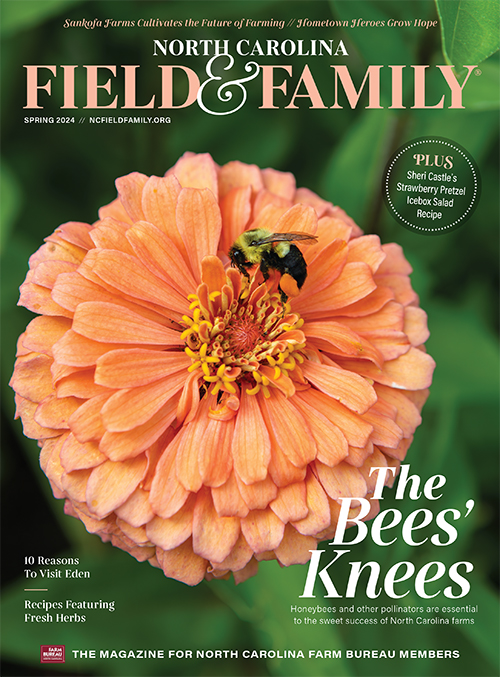John Burt Advocates for Land Preservation
Over the past 20 years, Wake County in Central North Carolina has grown and evolved tremendously. But for farmer John Burt, at least one thing has stayed the same.
Rachel Stroop |Over the past 20 years, Wake County in Central North Carolina has grown and evolved tremendously. But for farmer John Burt, at least one thing has stayed the same.
“Our farm is a land-grant farm that was gifted to my family in the 1750s by King George II,” Burt says. “I’m the ninth generation to farm this land.”
Today, Burt’s 700-acre farm, called Iron Horse Farms, remains active. John and his wife, Rachael, raise angus beef cows, alfalfa and Ozark coastal Bermuda grass, and offer full-service equine boarding.
See more: North Carolina Pork Farmers Are Committed to Top-Notch Care for Their Animals
“The farm has definitely changed over the years depending on what does well in the market,” Burt says.
At one point, his family grew tobacco and later row crops (which refers to crops grown in rows such as corn, soybeans and cotton). But Burt says he knew row crops weren’t going to be feasible in the long run, so he and Rachael began boarding horses.
“There’s unlimited demand for horse boarding here,” he says. “My wife had a lot of experience growing up around horses and helped design the operation. We had already been growing our own hay, so it was a good fit.”
And though Burt has adapted Iron Horse Farms to flow with the changing agricultural market, one thing he doesn’t want to change is his career. For farmers across the state, maintaining a profit as a farmer is becoming difficult as developers begin to move in, offering top dollar for farmland.

Working With the Growth
The population in Wake County has grown by 80% in the last several decades, and with it, new developments including housing, infrastructure and mixed-use have popped up across the county.
“I receive probably five requests per week to sell my land,” Burt says. “I’ve never considered selling.”
Instead, he makes it a point to advocate for farmland preservation while working with the developers who are building near his property.
“There are only two borders of our farm that don’t have houses adjacent to them,” Burt says. “Demand has been extremely high, so I try to work with developers, and they’ve mostly been respectful. Like most farmers, I can’t control anything outside of what I own, but I try to relay to them that I have to live with the new developments forever.”
See more: These Farm Families Have Been Feeding North Carolina for More Than a Century
Burt says he hasn’t had any major problems thus far but wants to make sure that people moving into the area understand Iron Horse Farms is an active farm.
“They might see cattle and smell manure or see me spraying my crops and they shouldn’t be offended or upset by that,” he says. “We also don’t want people thinking it’s a public park or somewhere they can come walk their dog.”
Burt adds that for the most part, people who move in nearby realize they have a pretty nice deal, settling next to land that isn’t going to be developed.
“It’s one of the few places in Wake County where you’ll be able to see this tranquil sunrise or sunset,” he says.

Advocating for Agriculture
In addition to being a full-time farmer, Burt serves as president of the Wake County Farm Bureau and chairman of the North Carolina Farm Bureau Equine Advisory Committee.
“The Farm Bureau has really good relationships with county commissioners, and in an era where things often seem partisan, we work with both parties where everyone is supportive of farming,” Burt says. “The Farm Bureau in Wake County has over 27,000 member families, and that number speaks volumes when we’re at a public hearing speaking to the issues for people in the rural part of the county.”
See more: The Future of North Carolina Farm Bureau
Burt says that being involved has helped him advocate for agriculture amongst ongoing development in a new way, especially when the COVID-19 pandemic set in.
“When supply chain problems started happening, there was a new energy where people realized we need farms close by,” he says. “If we can’t get food here, we’re in a lot of trouble.”
Burt understands that development is a way of life. As a growing county, new homes are needed. However, he thinks consumers are starting to shift their mindsets from feeling that farmers are clogging the roads to understanding the need for open space so farmers can provide food, fiber and fuel.

Preserving History
Along with supplying much-needed food, fiber and fuel, Burt adds that his farm and others are historical landmarks within the county and state.
“Cities often like to brag about certain historical houses or buildings, but the cultural heritage of this area is rooted in the century and bicentennial farms,” he says. “It’s an extremely populated county, but you also have really old farms.”
See more: Fearrington Village Showcases Southern Hospitality and Agricultural Roots
With its current urban sprawl, it’s hard to imagine Wake County as a rural area, but it used to be an agricultural community, and Burt says preserving that history is something worth fighting for.
“My kids are 8 and 10 years old, and I want them to be able to appreciate this land and our family heritage,” he says. “I don’t know many families that have been on the same land as long as we have. While there’s no telling what farming will look like in 15 years, the legacy of our farm is being able to transition with the times.”
– Rachel Stroop



Great article about farms coexisting with development.